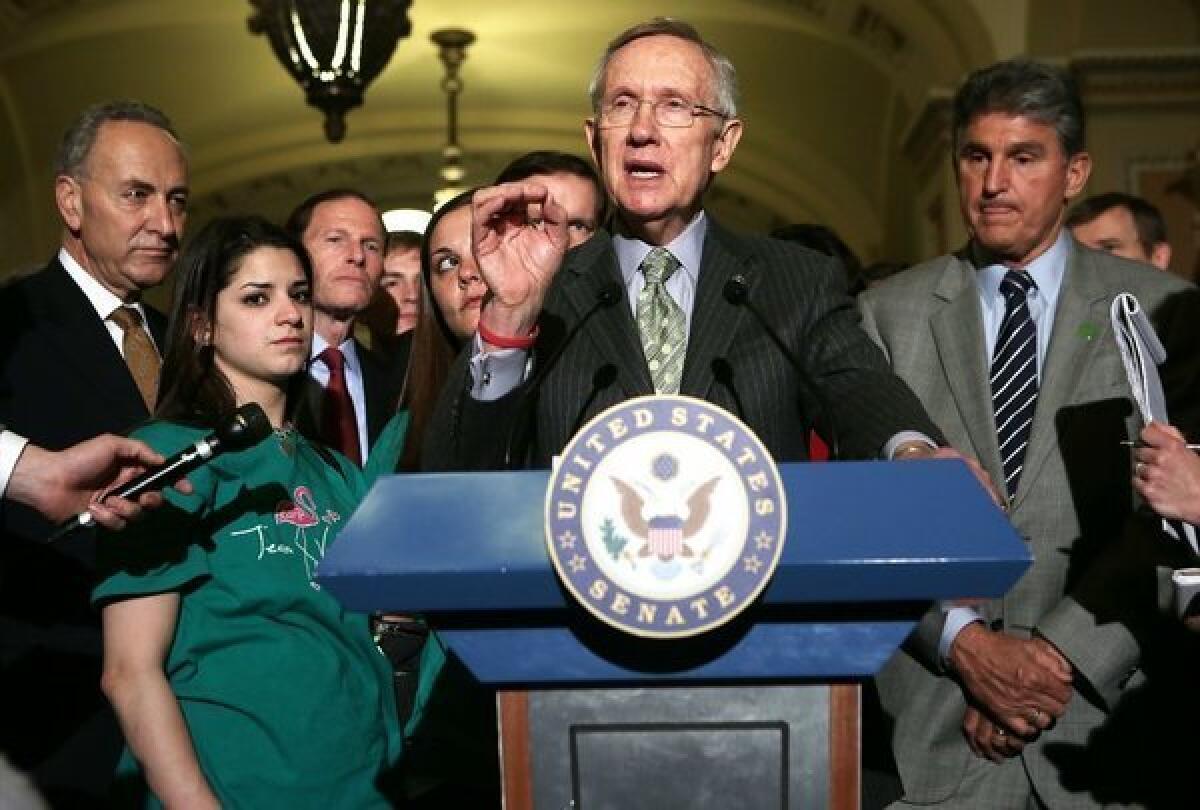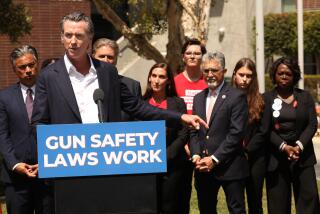Gun control: Wait till next year -- or the year after

Senate Majority Leader Harry Reid (D-Nev.) formally suspended the Democrats’ drive for new gun control legislation Thursday, shelving his party’s bill after Wednesday’s defeat of its centerpiece, a measure for expanded background checks on gun purchasers. But Reid, along with President Obama and former House Speaker Nancy Pelosi (D-San Francisco), insisted that they are determined to fight on. “This debate is not over,” Reid said. “In fact, this fight is just beginning.”
Are they whistling in the dark? In the short run, yes. The chances of significant gun control legislation passing in the current Congress are negligible. If the deaths of 20 schoolchildren in Newtown, Conn., and an emotional full-court press by Obama couldn’t do it, nothing can.
Yet some gun control advocates found reasons for long-term optimism even in the face of a stinging defeat. They noted that expanded background checks won a solid majority in the Senate despite furious lobbying by the National Rifle Assn. (the measure drew 56 votes, four short of the 60 it needed). Four Senate Republicans voted in favor of expanded background checks: John McCain of Arizona, Patrick J. Toomey of Pennsylvania, Susan Collins of Maine and Mark Kirk of Illinois.
The advocates note that national polls show at least 85% of Americans favor universal background checks, including majorities in every part of the country. The same polls show that most Americans mistakenly think universal background checks are already required under federal law. That odd fact may be more important than it sounds; indeed, one gun control lobbyist told me, it may be the key to this debate in the future.
It’s possible to argue, as UCLA professor Adam Winkler does in the New Republic, that this year’s effort failed because the Obama administration didn’t move fast enough after the tragedy in Newtown. But senators say this legislation actually moved at the equivalent of lightning speed in the Senate; the bipartisan proposal that failed wasn’t actually written until a few weeks ago.
The alternative view -- and the one many gun control advocates are clinging to, if only for solace -- is that the public still needs to be educated and organized on gun control. Now that we’ve had a vigorous national debate, more voters know -- for the first time -- that background checks aren’t universal. After all, they note, the 1993 Brady Bill, which established partial background checks, took six years to pass.
Some gun control advocates say they hope to use the issue to defeat senators who voted no in next year’s election. But there’s a problem with that strategy: In 2014, the most vulnerable senators who voted no are all red-state Democrats (Mark Pryor of Arkansas, Max Baucus of Montana and Mark Begich of Alaska). A campaign to unseat them might enable the GOP to gain a majority in the Senate, and that would make gun control legislation less likely, not more so.
The more plausible scenario, one gun control lobbyist told me grimly, is that one day another mass murder will occur, “this time, committed by someone who didn’t undergo a background check.” That, on top of Newtown and the education voters have absorbed over the last four months, might just be enough to make a difference.
ALSO:
On gun control, watch Tom Coburn
McManus: We’re safer than we think
More to Read
A cure for the common opinion
Get thought-provoking perspectives with our weekly newsletter.
You may occasionally receive promotional content from the Los Angeles Times.







